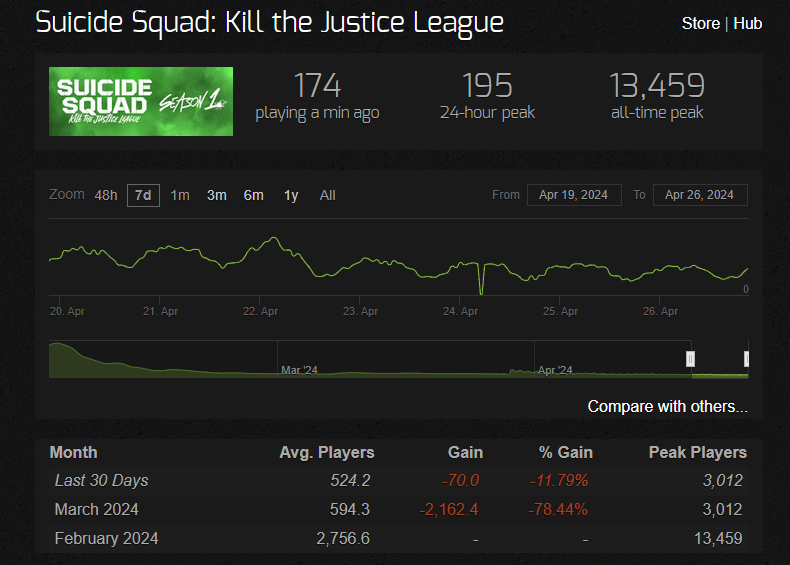Despite initial excitement surrounding the release of Suicide Squad: Kill the Justice League, the game soon encountered a barrage of negative reviews and criticism from both players and critics alike. This critical backlash reverberated across the internet, casting a shadow over Rocksteady’s ambitious endeavor.
One of the most telling indicators of the game’s underwhelming reception is its dwindling player base. Within a mere 24 hours of its launch, Suicide Squad: Kill the Justice League reached a meager peak of just 195 players on the popular gaming platform, Steam. This staggering decline in player engagement speaks volumes about the game’s inability to capture and retain the interest of its audience.
Bad Story-Telling, Bad Battle Pass, Lackluster Content, and What Else Do You Need To Be Fail?
The grim reality of Suicide Squad: Kill the Justice League‘s performance becomes even more apparent when juxtaposed with other similar titles in the gaming landscape. Notably, the game’s player count mirrors that of other underperforming live-service releases, such as Gotham Knights and even Marvel’s Avengers at certain points in time.
A closer examination of the data provided by Steam Charts reveals a concerning trend of continuous decline since the game’s launch. Despite a brief uptick in player numbers coinciding with the introduction of the first season and the addition of fan-favorite character Joker, Suicide Squad: Kill the Justice League has struggled to maintain a sustainable player base. Daily peak concurrent players have dwindled to a mere fraction of their former numbers, with recent figures hovering around 250 players and plummeting as low as 195 on April 26th.

It’s Nearly Impossible to be Saved
As industry observers assess the prospects for Suicide Squad: Kill the Justice League‘s revival, the prevailing sentiment seems to lean towards pessimism. While many live-service titles have demonstrated resilience and the potential for resurgence, the outlook for Rocksteady’s latest venture appears bleak.
Drawing comparisons to other big title, such as Redfall, which is suffered the same issue, only serves to underscore the challenges facing Rocksteady Studios in their attempts to revive interest in the game. The studio’s full commitment to the project leaves little room for immediate redirection or the commencement of new endeavors, further complicating the path forward.
As Rocksteady grapples with the fallout from this disappointing outcome, the road ahead remains uncertain. Whether the studio can overcome the challenges posed by Suicide Squad: Kill the Justice League and chart a course towards redemption remains to be seen.

